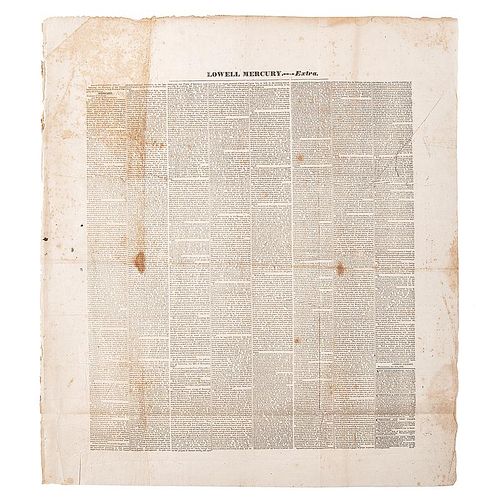Lowell Mercury Extra, Two Broadsides Featuring Messages from President Andrew Jackson on Nullification Crisis, 1832-1833
About Seller
6270 Este Ave.
Cincinnati , OH 45232
United States
With offices in Cincinnati, Cleveland and Denver, Cowan’s holds over 40 auctions each year, with annual sales exceeding $16M. We reach buyers around the globe, and take pride in our reputation for integrity, customer service and great results. A full-service house, Cowan’s Auctions specializes in Am...Read more
Two ways to bid:
- Leave a max absentee bid and the platform will bid on your behalf up to your maximum bid during the live auction.
- Bid live during the auction and your bids will be submitted real-time to the auctioneer.
Bid Increments
| Price | Bid Increment |
|---|---|
| $0 | $25 |
| $500 | $50 |
| $1,000 | $100 |
| $2,000 | $250 |
| $5,000 | $500 |
| $10,000 | $1,000 |
| $20,000 | $2,500 |
| $50,000 | $5,000 |
| $100,000 | $10,000 |
About Auction
Jun 9, 2017 - Jun 10, 2017
Cowan's Auctions dawnie@cowans.com
- Lot Description
Lot of 2 large, single sheet broadsides, the first, 15 x 20 in., The Lowell Mercury, Telegraph, and Compend(ium)---Extra. (MA), dated December 14, 1832. With bold caption headline that reads, Proclamation, By Andrew Jackson, President of the United States. The "Extra" features the entire Proclamation by Jackson to the people of South Carolina and is signed in type by the President, December 10, 1832. Printed in six columns of type on the front page and two columns of type on the back, with the remaining four columns blank.
Written by Edward Livingston, the Proclamation to the People of South Carolina was issued by Jackson on December 10, 1832. It was penned at the height of the Nullification Crisis and is a direct response to the Ordinance of Nullification passed by the South Carolina legislature in November 1832. Its purpose was to subdue the Nullification Crisis created by South Carolina’s ordinance and to denounce the doctrine of nullification. The proclamation outlines the actions taken by the South Carolina legislature and rejects the insistence on state sovereignty, focusing on the preservation of the Union as the primary issue. It declares nullification to be "incompatible with the existence of the Union, contradicted expressly by the letter of the Constitution, unauthorized by its spirit, inconsistent with every principle on which It was founded, and destructive of the great object for which it was formed." The proclamation also appeals to citizens to resist the violation of the Constitution.
Large broadside "Extra," 22 in. x 25.25 in., Lowell Mercury-Extra (MA), dated January 17, 1833. The broadside contains the full text of President Andrew Jackson’s Message to the US Congress on the Nullification Crisis, which is printed in full in eight columns of type and signed in type by Andrew Jackson / Washington, DC / Jan. 16, 1833.
President Jackson’s Message of January 1833 was his response to South Carolina passing the Ordinance of Nullification. Jackson called upon the Federal Government to pass a “force bill” to require South Carolina to collect Federal tariffs or else.
The “Force Bill” was passed by Congress and consisted of eight sections expanding presidential power. It was designed to compel the state of South Carolina's compliance with a series of federal tariffs. The bill was opposed by John Calhoun and other leading South Carolinians. Among other things, the legislation stipulated that the president could, if he deemed it necessary, deploy the US Army to force South Carolina to comply with the law. It authorized the president to use whatever force he deemed necessary to enforce federal tariffs. South Carolina purported to nullify the Force Bill as well, but simultaneously, a Compromise Tariff was passed by Congress, defusing the crisis.
While the Force Bill rejected the concept of individual states' rights to nullify federal law or to secede from the Union, this was not universally accepted. It would arise again during the build-up to the Civil War.
December 1832 broadside with stain through center of page. Edge wear, with some light chipping, few short tears, creases along edges. Few light spots. Bottom edge possibly trimmed slightly. January 1833 broadside with blank back, some spotting throughout, with heavier stain/spotting near top left corner of broadside. Light horizontal and vertical folds. Some wear along edges, including short tears, folds, some creasing, light chipping.Condition
- Shipping Info
-
SHIPPING. At the request of the buyer, Cowan's will authorize the shipment of purchased items. Shipments usually occur within two weeks after payment has been received. Shipment is generally made via UPS Ground service. Unless buyer gives special instructions, the shipping method shall be at the sole discretion of Cowan's Auctions, Inc.. Cowan's is in no way responsible for the acts or omissions of independent handlers, packers or shippers of purchased items or for any loss, damage or delay from the packing or shipping of any property.
-
- Buyer's Premium



 EUR
EUR CAD
CAD AUD
AUD GBP
GBP MXN
MXN HKD
HKD CNY
CNY MYR
MYR SEK
SEK SGD
SGD CHF
CHF THB
THB













